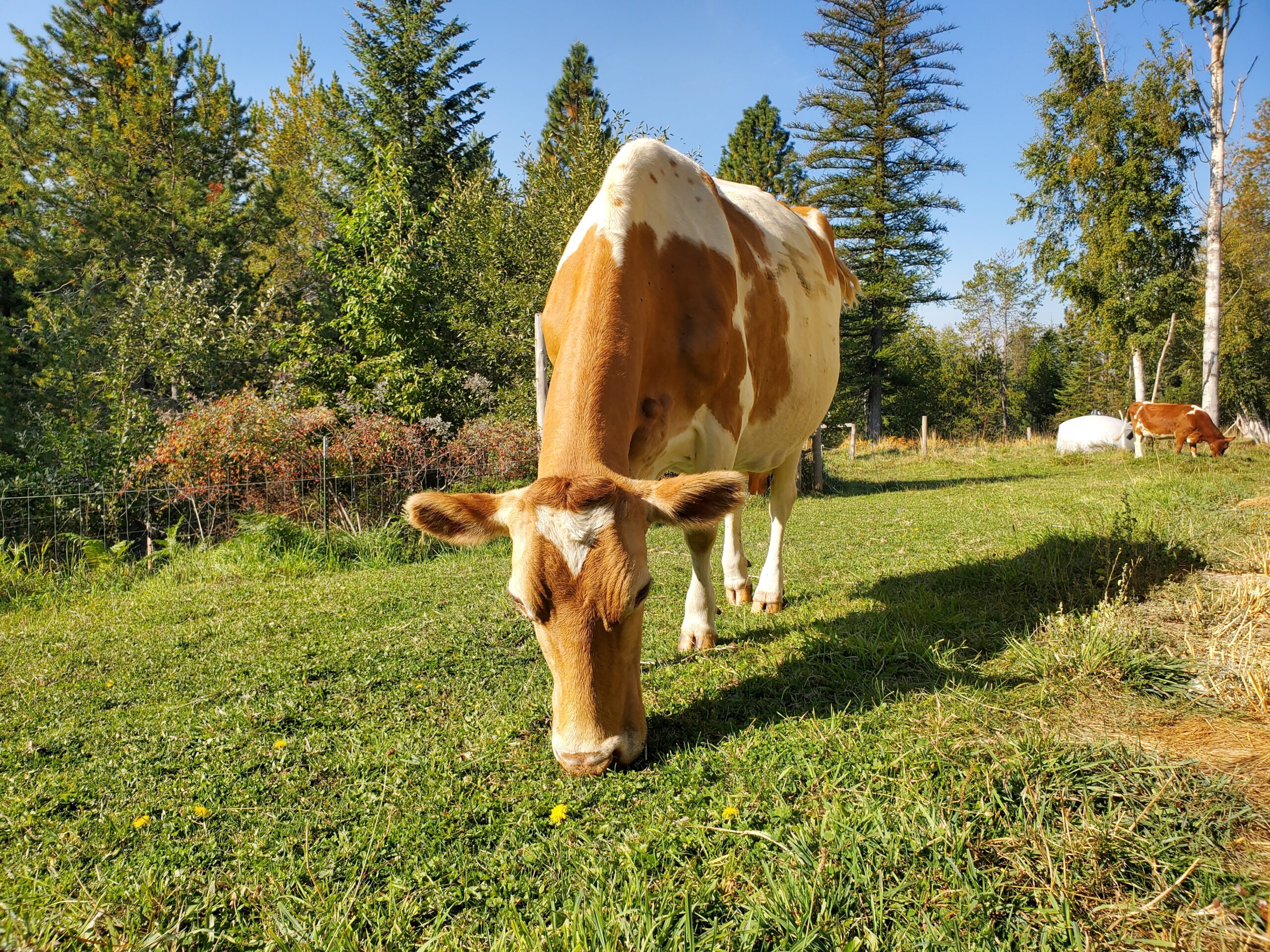The last dandelions and fresh grass
Cows like Dixie are on their final days this season consuming a 100% live grass diet, and with this come seasonal production fluctuations. Within weeks, we will be feeding hay and haylage. The bees on that dandelion know the days are numbered also and are busy gathering their last before winter.

As we go into fall, production drops since the cows do not produce as much milk in the winter as they do during the summer on fresh grass.
Therefore you may be having a harder time getting your hands on Guernsey Goodness.
Cows get vacation
Other types of seasonal production fluctuations are caused by who is calving, who is on vacation, and how long it has been since a cow calved.
We also have three cows currently on pre-calving vacation – due in October, and we had one cow calve three weeks ago but get super sick days before calving and her hormones went loopy. As a result, she is now super healthy but is producing practically no milk.
Calves drink a lot
In the meantime, her little girl, Venice, is consuming 4 half gallon bottles per day, and the calves altogether consume about 29 bottles per day. They drink the very same milk you do since we do not use milk replacer on our farm. We also have no set weaning schedule so we can maximize growth to get them to breeding age sooner. Typically, the calves self-wean sometime between 6 and 8 months, and we taper them off toward that goal, but let them decide when they’re done. We have one heifer right now who is 9 months old still getting a bottle a day, but she is an outlier. I personally feed her and kind of enjoy it, but she and I both know the days are numbered…
Expansion plans
To help with seasonal production fluctuations and increasing demand, we could buy more cows, but that’s an exercise in and of itself, and right now we’re upgrading our milking parlor and expanding the holding area to be able to double the herd size. Then, we need to expand cow barns and add a commodity (feed and equipment) barn. Since we have all that to do, we are limiting the growth to just the heifers we produce. This year, only three added to the herd. Next year, it will be five, and the following year at least 8.
All this information is so you can understand where we are and where we are going. If you have a hard time getting hands on milk, know that won’t always be the case.
Rinse your bottles please
A final note: The hardest part of the operation is bottle washing. It’s a very easy job if every bottle was rinsed by customers, but that’s not the case. In fact, there are a significant number of customers who seemingly are not acquainted with the concept of rinsing bottles. When bottles come to use not rinsed very well, they require significantly more work reconditioning for re-use, and the labor is manual. The bottle wash machine is not able to compensate for dereliction of customer duty. If you take an unrinsed bottle to a store, and the store clerk gives you a refund, know that you just stole money right out of the pocket of that store. We do take those bottles back, but we don’t pay for them since they require more labor. Therefore, the store gets stiffed $3.75.
Do the store and us a favor and rinse those bottles before you return them, or buy your milk in plastic and leave the glass-bottled milk for others ![]()
Steve Plog
Thanks for all you’re doing for us, Paul. We DO appreciate your hard work and all the work the “girls” put in, too! :0)
Ronelle Corbey
Your girls’ milk is THE best we have ever had and the only one we buy. We were wondering if organic also includes no vaccinations. Do you vaccinate your cows? Thank you so much.
Paul Herndon
The land is certified organic. The cows are not. If they were, vaccinations would be an important contribution to health. Since we are able to use effective antibiotics to treat sick cows, we only do the required Bang’s vaccine before a cow is one year old. This is required by Idaho. We also vaccinate heifers for blackleg, since all blackleg is fatal.
Jennifer
I have recently seen that there are mRNA vaccines coming to our food supply. Just wanted to check and see what your thoughts are.
Paul Herndon
The only vaccines we give to our cattle are the Bang’s vaccine, which is required in Idaho in female cattle between 4 and 12 months old. To our knowledge there are no plans that this will end up as an mRNA vaccine.